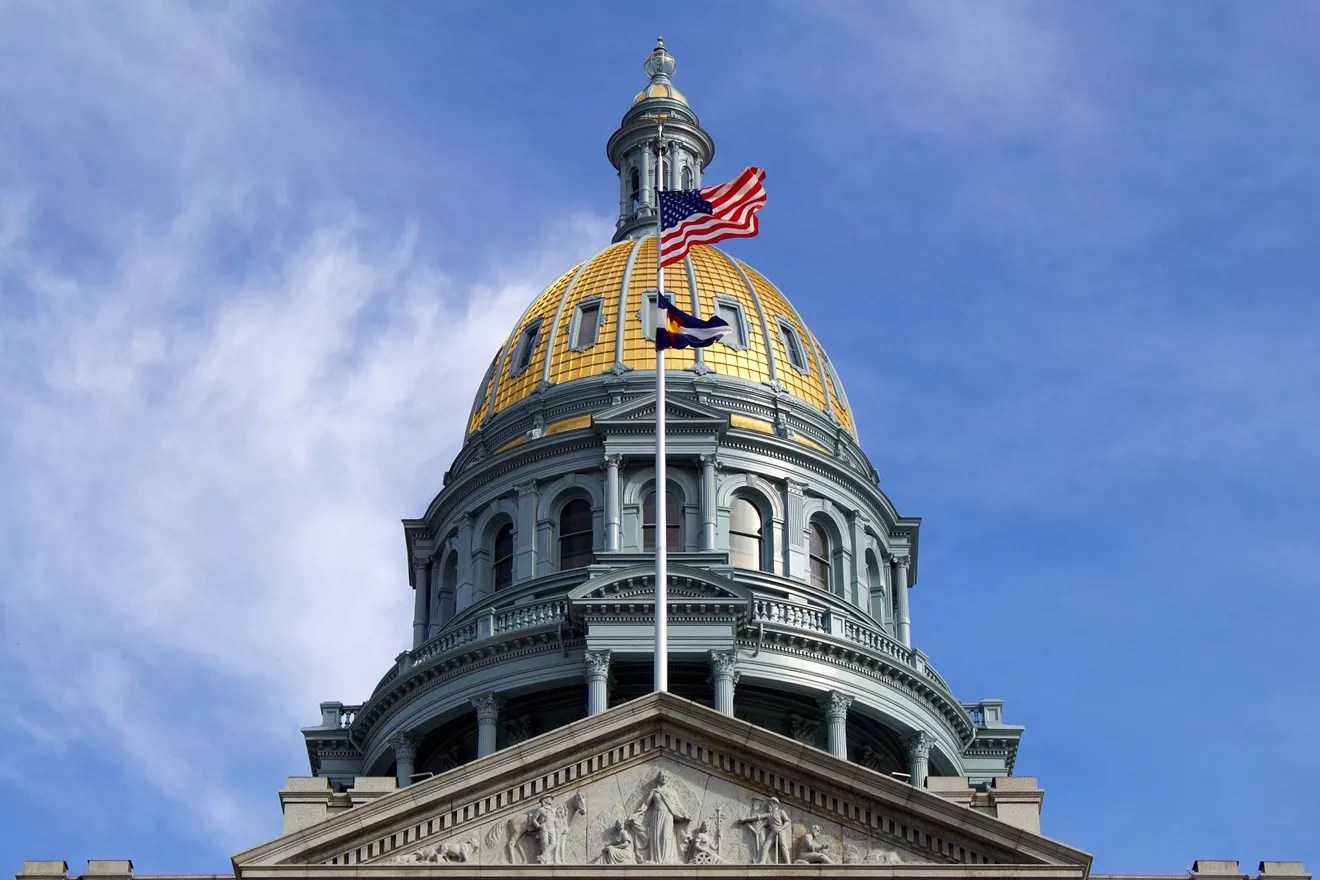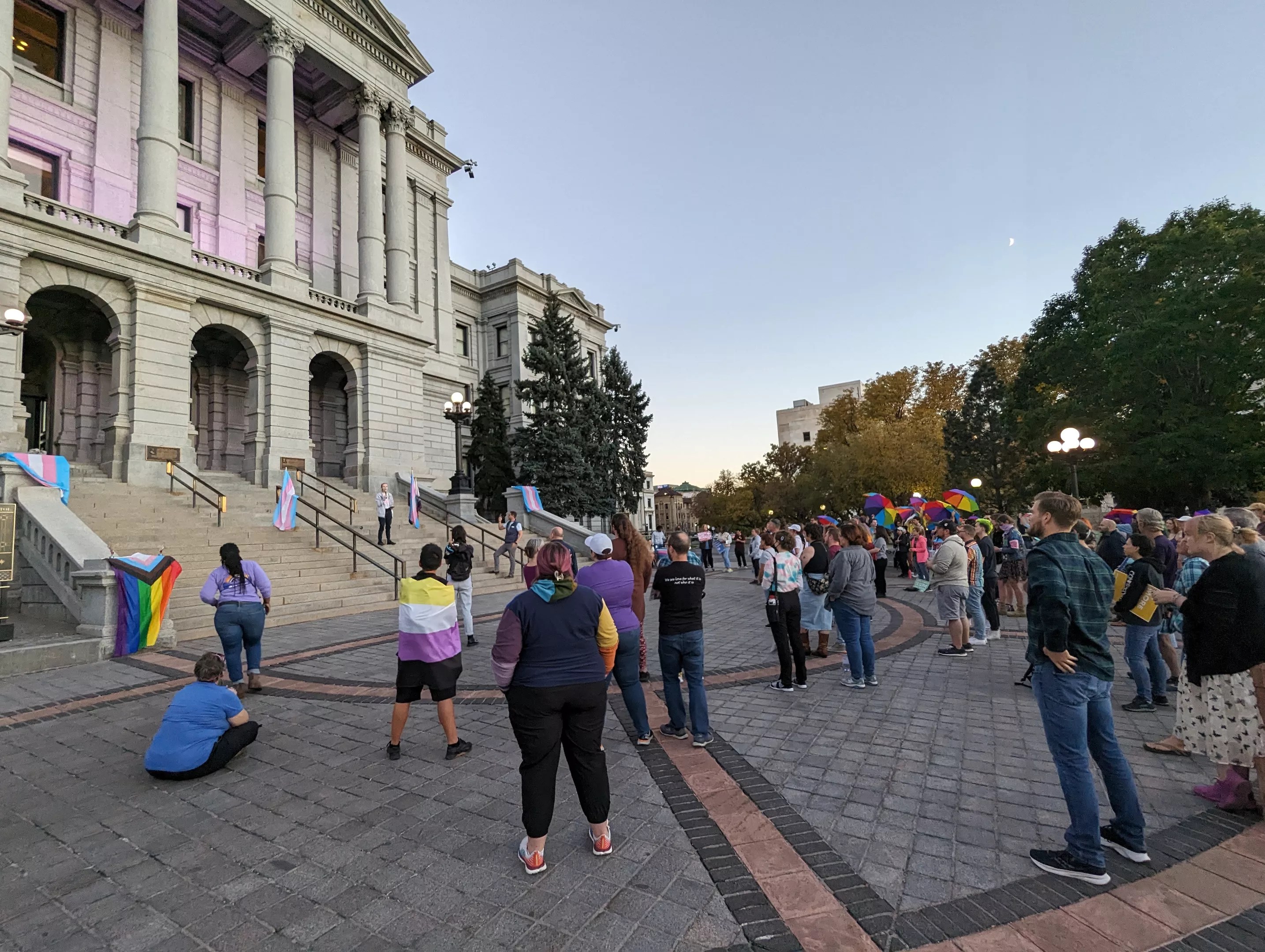
Karollyne Videira Hubert/Unsplash

Audio By Carbonatix
August Tribble had known he was transgender since middle school, but halfway through his high school career, he was finally ready to come out. His transition largely coincided with the lockdowns and virtual learning that came with the pandemic, so when Tribble returned to school, many of his classmates didn’t recognize him or know him from before. To them, he was just August.
That changed when a substitute teacher came to class. Reading off the class roster, the teacher said each student’s name aloud to take attendance. When Tribble came up, the teacher didn’t say “August.” Instead, the sub called out his female birth name, known as a “dead name” in the transgender community.
The anonymity Tribble had briefly enjoyed was gone. But your real name is so pretty, why wouldn’t you go by it? That’s not the name I remember you as. Changing your name won’t change the fact that you’re a woman. Tribble recalls hearing such comments from both students and teachers. He says he faced consistent microaggressions and bullying, with some students even threatening his physical well-being.
“That ended up outing me to a lot of people that it was not safe to be outed in front of,” Tribble says. “It made it really hard to show up to school.”
Tribble went to his advisor at Manitou Springs High School and asked to change his name in the school’s system so that that kind of thing wouldn’t happen again. The advisor said nothing could be done, claiming the system had to align with Tribble’s legal name. He went to a school administrator and was told the same thing. For six months, Tribble repeatedly tried and failed to get his name changed – until a staff member with a transgender child offered to help.
With that staff member now by his side, it took less than fifteen minutes for the school to change his name to “August” in its internal records, Tribble says, though his dead name remained visible in some places, including class rosters.
“It felt very disheartening,” says Tribble, now an eighteen-year-old college student. “The staff members who told me they could do nothing ended up going through with changes. At the core of it, it’s a safety issue. For schools to not be understanding or give the resources for non-legal name changes to happen, it creates a lot of issues.”
The school took steps to adjust its name-change protocol after Tribble’s experience was publicized in a student newspaper, he says. But now, Colorado students are pushing for changes statewide.
Teenagers from the Colorado Youth Advisory Council brought House Bill 1039 to the Colorado Legislature. If passed into law, the bill would declare that a person’s chosen name falls within the legal discrimination protections of gender identity, and would require schools to have a non-legal name-change policy in order to comply with the law. This would let students change their names in unofficial records, such as attendance lists, yearbooks and student IDs.
The bill is scheduled to face its first committee vote on Thursday, February 15.
Meghan Taylor, a seventeen-year-old member of the Youth Advisory Council, led the drafting of the bill, inspired by the experience of Tribble and other transgender students at Manitou Springs High School.
“As far as LGBTQ+ acceptance goes, Manitou Springs High School is really excellent. If this was an issue that we’re having here, what issues are students having statewide in schools that aren’t as accepting?” Taylor says. “We’re trying to ensure that, for trans students and nonbinary students and gender-diverse students, school can be a safe place.”

House Bill 1039 will have its first committee vote on Thursday, February 15.
Hannah Metzger
Transgender youth face higher rates of depression, anxiety and suicide than the general population. In Colorado, 52 percent of transgender and nonbinary youth seriously considered suicide in 2022, and 17 percent attempted suicide, according to a state survey by the Trevor Project. But they’re half as likely to attempt suicide when their preferred names and pronouns are used at home, school and/or work, according to research out of Texas and Minnesota.
“The purpose of this bill is to show trans and gender-diverse students that they are valid, they are real, they are loved,” Taylor says. “I’m really hoping it will allow more students to have a more inclusive space where they don’t have to be afraid.”
What About the Parents?
Erin Lee says her twelve-year-old daughter was “convinced her normal pubescent discomfort means she is transgender” when she started attending after-school Genders and Sexualities Alliance meetings at Larimer County’s Wellington Middle School in 2021.
Through a national media campaign and self-produced documentary, Lee has touted her story as a cautionary tale of allowing students to “socially transition” in schools. She says her daughter was encouraged to identify as transgender and to hide it from her family, resulting in her becoming depressed and suicidal. Lee and a few other parents sued the school district for allegedly violating their parental rights, but a judge dismissed the case in December.
Lee testified against HB 1039 when its concept was first discussed by an interim committee in October, arguing that it would make it easier for students to fall into situations like her daughter’s.
“Now fourteen, my daughter has said that if we [had] affirmed her confusion, she doesn’t think she’d be alive today,” Lee said. “Parents like me are kept in the dark and bullied into going along with transition even when we know it’s not right for our children. Please don’t perpetuate this bullying of teachers and parents to do what they know is wrong for some children.”
Using similar justification, other states have gone in the opposite direction of Colorado: Some schools in Florida and Iowa now require parental permission for students to use any nickname in school, even if it has nothing to do with their gender.
In Colorado, however, state law already mandates that a transgender person’s preferred name and pronouns be respected. The Colorado Civil Rights Commission qualifies deliberately misusing someone’s preferred name or pronouns as sexual orientation harassment, which becomes unlawful if the misuse is severe and pervasive. And in 2021, the legislature added “gender expression” and “gender identity” to the state’s protected-class discrimination laws.
This new proposal would clarify that preferred names are covered under gender identity discrimination laws and that schools must adhere to these laws by having policies in place that allow students to use their preferred names.
But Lee and other opponents of the bill take issue with the fact that it would not require schools to include parental notification in their name-change protocols. They insist that a student’s parents be informed when their child requests a name change at school.
“You’re keeping this from the parents,” Senator Janice Rich, a Grand Junction Republican, said at the interim committee meeting. “Do you think it’s a good example to set to keep things like this, especially a name change, from parents? Do you think that’s a good example to set?”
Proponents of the bill say transgender youth may want to be called their preferred name at school even if they’re not out at home. According to Taylor, notifying a student’s parents when they change their name could create dangerous environments in non-accepting homes. A 2021 study found that transgender teenagers are more likely than cisgender teens to be abused, with 39 percent of trans teens reporting experiencing physical abuse and 73 percent reporting psychological abuse.

Transgender rights rally at the Colorado Capitol in October 2023.
One Colorado
Colorado also has a precedent for letting minors make decisions separate from their parents. State law allows twelve-year-olds to receive mental health treatment without the permission or knowledge of their parents.
Nevertheless, Representative Ron Weinberg says he’s concerned that hiding the school name change from parents would only discourage them from accepting their transgender children, arguing that advocates should instead focus on motivating parents to let their child legally change their name.
“Why aren’t we pushing to have parents accept that the name change should be valid and they should go change the name?” Weinberg, a Loveland Republican, said during the interim committee hearing. “I think doing things behind parents’ backs pushes more the air of being deceitful rather than accepting.”
“You can’t legislate acceptance,” Taylor said in response.
What’s in a Name?
Halfway through her very first year as a teacher, Senator Janice Marchman was notified that a new student was joining her eighth-grade advisory class. Marchman excitedly announced to her students: “We’re getting a new girl tomorrow!” and shared the student’s name.
But the next day, the new student who walked into Marchman’s classroom was not a girl. The student used he/him pronouns and went only by the first syllable of his name – not the name and gender that were listed on Marchman’s roster.
“As a teacher, it was devastating that that’s how we started this relationship,” Marchman says. “The other students were like, ‘Why did you tell us we had a girl coming?’ It was just awful.”
Marchman says she apologized to the student and showed him how to add a nickname to his student portal so his preferred name would show up on Marchman’s class roster. But even with that system, the nicknames don’t appear on all copies of rosters, such as the ones often picked up by substitute teachers from the front desk.
Marchman says it took months to regain the student’s trust and make him feel safe “because of what I shared.” But by the end of the semester, “the student was sharing with all the other students the struggle of his mom always wanting to put him in a dress and always resenting everything that he was.”
Still working as a middle-school teacher, Marchman says she often sees students change their names and identities at this age. She doesn’t make a big announcement when it happens; she just starts using the preferred name in class. Sometimes it sticks for good, and sometimes it doesn’t. Marchman compares it to her own name-change experience in tenth grade when she made her friends and teachers call her “Shelly” for six weeks (a shortened version of her middle name) before switching back to “Janice.”
“It happens, and it’s good,” Marchman says. “I feel glad that they feel comfortable enough to come talk to me about it. My hope is that we can come up with a way that, no matter where a student is going to school, they can be called what they want to be called.”
Marchman, a Loveland Democrat, is sponsoring HB 1039 along with Representative Stephanie Vigil and Senator Faith Winter. The bill goes to the House Education Committee on February 15.
As originally drafted, the bill would have created a task force to develop a statewide protocol for how schools handle non-legal name changes. But Vigil plans to amend the bill to just require that schools have a protocol in place, to “clarify that schools will need to have a policy that ensures compliance with non-discrimination law,” she says. The amended bill would still not mandate whether parents are notified when students change their name at school – the biggest ask of opponents.
And Marchman does not intend to add any parental notification requirement to the bill down the line. “That’s a pretty bright line for me,” she says. “It can create some unsafe and just unsavory situations at home.”
So far, a dozen organizations have thrown their support behind the bill, including the Colorado School Counselors Association, Society of School Psychologists and the LGBTQ+ advocacy group One Colorado. Only two organizations are registered against the bill: Colorado Parent Advocacy Network and Christian Home Educators of Colorado.
This comes after legislators passed a bill last year to shield patients and providers of gender-affirming care from potential penalties from other states. Other transgender-related bills being considered this year include a proposed study on the availability of gender-affirming health care in Colorado and legislation to let felons legally change their names to align with their gender identity.
“This really, truly, just comes from a place of concern for all of my transgender friends in the world who cannot live as they truly are,” Taylor says of HB 1039. “Hopefully, we’re able to turn the tide for transgender-rights legislation.”